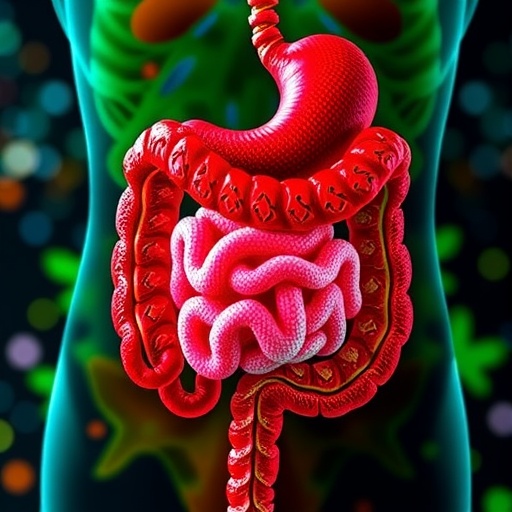Researchers at Osaka Metropolitan University have made a breakthrough in understanding how alterations in gastric microbiota contribute to the development of neuroendocrine tumors (NETs) in patients with autoimmune gastritis (AIG). This chronic autoimmune condition attacks the stomach lining, leading to progressive tissue damage and functional impairment. The team’s pioneering work deciphers the complex interplay between microbiota dynamics and metabolic reprogramming in the gastric environment, paving the way for novel diagnostic approaches to identify patients at elevated cancer risk early.
Autoimmune gastritis represents a paradigm of sustained immune dysregulation, where antibodies mistakenly target parietal cells and intrinsic factor, essential components of the gastric mucosa. This immune onslaught disrupts acid secretion and intrinsic factor production, compromising nutrient absorption and mucosal defense. Over extended periods, this damage increases susceptibility to malignant transformations such as gastric neuroendocrine tumors—neoplasms arising from hormone-secreting endocrine cells within the stomach lining.
Central to this investigation is the gastric microbiota—a diverse consortium of microorganisms maintaining mucosal integrity and immunological homeostasis. Dr. Koji Otani’s group employed metagenomic sequencing of DNA extracted from gastric biopsy samples to chart shifts in microbial diversity and composition between AIG patients with and without NETs. This bacterial profiling was integrated with metabolomic analyses of the tissue specimens, elucidating alterations in cellular metabolism correlating with tumor development.
A critical metric in microbiome research, alpha diversity, quantifies species richness and evenness within a microbiotal community. The study revealed a consistent reduction in alpha diversity in AIG patients, signifying a compromised and imbalanced gastric ecosystem. Notably, patients who progressed to develop NETs exhibited distinctly different microbial signatures compared to those without tumors, underscoring a possible microbial role in oncogenic progression.
Elevated abundance of specific taxa characterized the NET-positive group. Haemophilus parainfluenzae and members of the Fusobacterium genus, especially F. periodonticum and F. nucleatum, were markedly enriched. These bacteria, although present in healthy stomachs, when disproportionately abundant can provoke chronic inflammation—a known facilitator of tumorigenesis. These findings align with previous research linking Fusobacterium species to gastrointestinal malignancies through promotion of inflammatory microenvironments.
Conversely, a significant decline in beneficial lactic acid bacteria and Streptococcus salivarius was observed in NET-bearing patients. These commensals typically contribute to mucosal health by producing antimicrobial agents and modulating immune responses to suppress pathogenic overgrowth. Their depletion may therefore weaken mucosal defenses, enabling pathogenic bacteria to flourish and potentially trigger carcinogenic pathways.
Metabolomic studies provided further mechanistic insights by revealing metabolic reprogramming in AIG tissues. Classic energy-producing pathways, such as glycolysis and the tricarboxylic acid (TCA) cycle, exhibited diminished activity, indicating a metabolic shift. The tissue appeared to compensate by enhancing alternative pathways capable of meeting cellular energy demands under pathological conditions. Such reprogramming is characteristic of cancerous and pre-cancerous states, influencing cellular proliferation, immune evasion, and tissue remodeling.
The metabolic environment shaped by these alterations likely creates a permissive niche facilitating harmful bacterial colonization and tumor initiation. Dr. Otani’s team posits that metabolic shifts precede microbial community changes, orchestrating a microenvironment conducive to the expansion of tumor-associated bacteria. This temporal sequence offers compelling evidence for host metabolism as a trigger for microbiota dysbiosis and subsequent tumorigenesis in AIG.
These novel insights not only advance the fundamental understanding of gastric tumor biology but also hold clinical promise. Identifying metabolic and microbiotal biomarkers predictive of NET development could revolutionize surveillance and early detection strategies in high-risk AIG populations. Furthermore, targeting metabolic pathways or restoring microbial balance could emerge as therapeutic avenues to prevent or mitigate tumor progression.
This study represents an interdisciplinary triumph, integrating microbiology, immunology, and metabolomics to decode the pathogenesis of gastric NETs within the context of autoimmune disease. The comprehensive approach underscores the intricate host-microbe-metabolite crosstalk influencing disease trajectories, emphasizing that gastric cancer risk cannot be fully appreciated without considering microbial ecology and host metabolic state.
Published in the Journal of Gastroenterology, this research marks a significant milestone in gastroenterological oncology and autoimmune disease management. It sets a precedent for future investigations into how chronic autoimmune conditions reshape mucosal environments and foster malignancies, ultimately aiming to translate molecular discoveries into precision medicine applications.
As physician-scientists seek to unravel the molecular drivers of complex diseases, understanding how autoimmune processes impact microbiota and metabolism is crucial. This work from Osaka Metropolitan University epitomizes the potential of integrative research to generate actionable knowledge, improving outcomes for patients afflicted with challenging conditions like autoimmune gastritis complicated by neuroendocrine tumor formation.
Further research will undoubtedly focus on validating these biomarkers in larger cohorts and exploring intervention strategies that can prevent the metabolic shifts or microbiota imbalances that favor tumor development. The promise lies in transforming this foundational knowledge into effective clinical tools that enhance early diagnosis, tailored treatment, and perhaps even prevention of gastric NETs.
Subject of Research: People
Article Title: Development of gastric mucosa-associated microbiota in autoimmune gastritis with neuroendocrine tumors
News Publication Date: 11-Sep-2025
Web References: https://www.omu.ac.jp/en/
References: Journal of Gastroenterology, DOI: 10.1007/s00535-025-02298-w
Image Credits: Osaka Metropolitan University
Keywords: Autoimmune gastritis, gastric microbiota, neuroendocrine tumors, metabolic reprogramming, Fusobacterium, Haemophilus parainfluenzae, lactic acid bacteria, Streptococcus salivarius, gastric cancer, metabolomics, microbiome, tumor microenvironment
Tags: autoimmune gastritis and cancerdiagnosing cancer risk with microbiota analysisgastric microbiota and immune dysregulationgut microbiota alterationsmetabolic reprogramming in gastric environmentmetagenomic sequencing in cancer researchmicrobial diversity in autoimmune diseasesneuroendocrine tumors in gastric patientsnovel diagnostic approaches for cancer detectionparietal cells and intrinsic factor in AIGrelationship between microbiota and neuroendocrine tumorstissue damage in autoimmune gastritis





